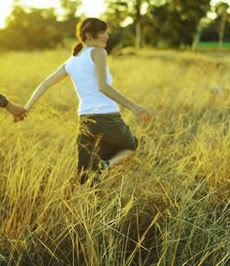
Spending time outdoors is a cherished tradition for many people, while others avoid the outdoors due to allergies, phobias, a lack of access or just a lack of interest. So many of us are surrounded every day by man-made technology designed to simplify our lives - such as cars, computers, and cell phones - but which can ultimately increase the pace of life, leaving us harried, stressed and sick. Sometimes we lose track of the
peace and happiness that can be achieved just by taking a walk in the park or spending a day at the beach.
The psychological and physical affects of looking at or being near nature are more profound than most people realize. Studies have found that nature scenes help students perform better on tests, relieve anxiety in patients recovering from
open heart surgery, help patients recover faster after
gall bladder surgery, and reduce headaches and sickness in prison inmates. It's also been shown that spending time outside lessens
fatigue in breast cancer patients and reduces outbursts from Alzheimer patients. And a recent study at the University of Illinois revealed that playing outdoors, particularly in lush green areas, can
reduce symptoms of ADHD in children.
Sunlight is important for the production of
serotonin in the brain, as well as for the production of
vitamin D. The cells that make up our skin are built much like solar panels in the way they convert sunlight to the vitamin D necessary to maintain
calcium levels in our blood and
ensure strong bone structure. Vitamin D can also
reduce the risk of certain types of cancers, type 2 diabetes, heart disease, hypertension, and osteoporosis. Although many foods contain vitamin D and many others are fortified with vitamin D, it is not as readily and safely absorbed by our bodies as the vitamin D that comes from pure sunlight. Approximately
80 percent of our daily vitamin D requirement is met through direct sunlight. However, 42 percent of African Americans between the ages of 15 and 29 and 36 percent of Caucasians ages 18 to 29 are vitamin D deficient.
A vitamin D deficiency increases the risk of developing hyperparathyroidism, type 1 diabetes, hypertension, certain cancers and heart failure. Spending a few minutes outside a few times a week can ensure you get enough vitamin D, and any excess vitamin D is stored by your body for several weeks.
Spending time outdoors can be especially beneficial during pregnancy. The vitamin D you get from the sun
helps promote fetal bone growth and reduce maternal bone loss during pregnancy, while
the vitamin D found in breast milk is necessary for your child's skeletal and mental development. Walking near a body of water or taking a stroll in the woods can
lower your blood pressure and improve your mood, which can help you relax and have a more comfortable pregnancy.
If you can't easily access a natural area or if you simply don't enjoy being in the great outdoors, you can purchase many items to help you bring a bit of nature inside your home. CDs featuring the roar of the ocean or birds singing in the forest can help you relax, while natural loofahs, mud masks, salt scrubs, seaweed wraps, light machines and natural light bulbs imitate some of the relaxing and healing qualities of the outdoors.






